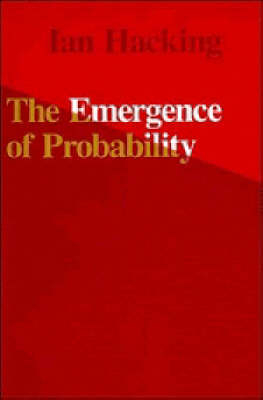
The Emergence of Probability
A Philosophical Study of Early Ideas about Probability, Induction and Statistical Inference
Seiten
1984
Cambridge University Press (Verlag)
978-0-521-31803-7 (ISBN)
Cambridge University Press (Verlag)
978-0-521-31803-7 (ISBN)
- Titel erscheint in neuer Auflage
- Artikel merken
Zu diesem Artikel existiert eine Nachauflage
Ian Hacking here presents a philosophical critique of early ideas about probability, induction and statistical inference and the growth of this new family of ideas in the fifteenth, sixteenth and seventeenth centuries. The contemporary debate centres round such figures as Pascal, Leibniz and jacques Bernoulli.
Historical records show that there was no real concept of probability in Europe before the mid-seventeenth century although the use of dice and other randomizing objects was commonplace. Ian Hacking here presents a philosophical critique of early ideas about probability, induction and statistical inference and the growth of this new family of ideas in the fifteenth, sixteenth and seventeenth centuries. The contemporary debate centres round such figures as Pascal, Leibniz and Jacques Bernoulli. What brought about the change in ideas? The author invokes in his explanation a wider intellectual framework involving the growth of science, economics and the theology of the period.
Historical records show that there was no real concept of probability in Europe before the mid-seventeenth century although the use of dice and other randomizing objects was commonplace. Ian Hacking here presents a philosophical critique of early ideas about probability, induction and statistical inference and the growth of this new family of ideas in the fifteenth, sixteenth and seventeenth centuries. The contemporary debate centres round such figures as Pascal, Leibniz and Jacques Bernoulli. What brought about the change in ideas? The author invokes in his explanation a wider intellectual framework involving the growth of science, economics and the theology of the period.
1. An absent family of ideas; 2. Duality; 3. Opinion; 4. Evidence; 5. Signs; 6. The first calculations; 7. The Roannez circle (1654); 8. The great decision (1658?); 9. The art of thinking (1662); 10. Probability and the law (1665); 11. Expectation (1657); 12. Political arithmetic (1662); 13. Annuities (1671); 14. Equipossibility (1678); 15. Inductive logic; 16. The art of conjecturing (1692[?] published 1713); 17. The first limit theorem; 18. Design; 19. Induction (1737); Bibliography; Index.
| Erscheint lt. Verlag | 21.6.1984 |
|---|---|
| Zusatzinfo | Worked examples or Exercises |
| Verlagsort | Cambridge |
| Sprache | englisch |
| Maße | 137 x 213 mm |
| Gewicht | 271 g |
| Themenwelt | Geisteswissenschaften ► Philosophie ► Logik |
| Mathematik / Informatik ► Mathematik ► Wahrscheinlichkeit / Kombinatorik | |
| ISBN-10 | 0-521-31803-3 / 0521318033 |
| ISBN-13 | 978-0-521-31803-7 / 9780521318037 |
| Zustand | Neuware |
| Haben Sie eine Frage zum Produkt? |
Mehr entdecken
aus dem Bereich
aus dem Bereich
ein Gegenentwurf zum kurzfristigen Denken : so werden wir zu den …
Buch | Hardcover (2023)
REDLINE (Verlag)
CHF 27,90



